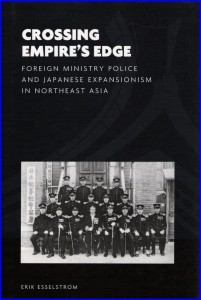“Esselstrom’s careful and well-written study of the history of the Foreign Ministry Police casts fresh light on Japan’s imperial history. . . . [It] is a very welcome and illuminating addition to the growing trans-border literature on the modern history of Northeast Asia.” —Japanese Studies (31:3, December 2011)
“Packing significant interpretive punch, Erik Esselstrom’s tightly focused book zeroes in on the Japanese Foreign Ministry’s consular police during the period of Japanese imperialism. . . . It is an important and overdue addition to our understanding of the Foreign Ministry and builds on earlier scholarship that highlighted the diversity of opinion within the multilevel and multifaceted institution.” —Journal of Asian Studies (January 2010)
“This excellent study goes far beyond the boundaries of institutional history and makes a significant contribution to our understanding of the complex vistas of the history of Japanese imperialism in the twentieth century and the role of the Foreign Ministry in that venture.” —Monumenta Nipponica (64:2, 2009)
“Students of modern Japan, Northeast Asia, and comparative imperialism will welcome this in-depth exploration of the police forces administered by Japan’s Foreign Ministry in Korea and China from 1880 to 1945. The author treats the Foreign Ministry not simply as an institution of diplomacy but, as importantly, as part of the Japanese imperial state’s apparatus of agencies for disciplining and ‘protecting’ national subjects (which included colonized Koreans and Taiwanese) and suppressing ‘anti-Japanese’ ideas and actors abroad and at home. He shows the Foreign Ministry police to have been active participants in often violent expansionist endeavors throughout their history, and not just after 1931, when the army’s occupation of Manchuria ushered in a new phase of Sino-Japanese conflict. Throughout, Esselstrom demonstrates how colonialist projects, as well as networks of collaboration and resistance, could traverse territorial boundaries, destabilize notions of sovereignty, and complicate our understanding of formal and informal empire in a region where historically fraught debates on these subjects have lost none of their potency.” —David R. Ambaras, North Carolina State University
“This absorbing, richly archival study highlights the enormous complexity of late nineteenth, early twentieth-century empire building and demolishes persistent tropes regarding Japanese expansion. It features not the Imperial Army but the Foreign Ministry as principal agent of empire and locates antecedents to formal control in China in consular police activity long before 1931. In the mounting scholarly campaign to integrate events in the empire with developments in metropolitan Japan, Esselstrom sets a dramatic new standard.” —Frederick R. Dickinson, University of Pennsylvania

